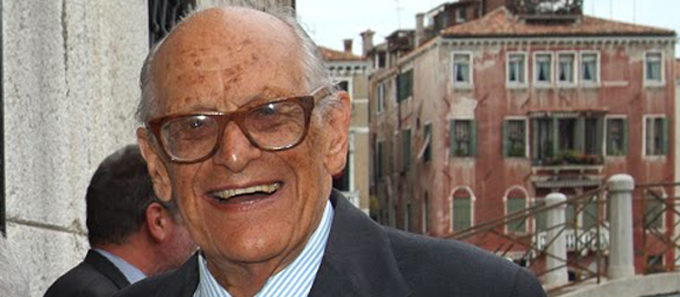
Vittore Branca
President of the Foundation from 1995 to 1996
Vice President of the Foundation from 1972 to 1995
Secretary-General of the Foundation from 1953 to 1988
Vittore Branca was born in Savona on 9 July 1913. He studied at the Scuola Normale Superiore and graduated from the University of Pisa in 1935 with honours (and the publication of his thesis). His mentors included Attilio Momigliano and Mario Casella in Pisa and Michele Barbi and Luigi Foscolo Benedetto in Florence.
Branca was a professor at the University of Florence, the University of Rome, the University of Catania and, from 1953 on, at the University of Padua, where he was named Professor Emeritus. He dedicated much of his life to the study of Boccaccio, of whom he is considered the greatest contemporary scholar, authoring the first complete edition of his works in Italian and Latin and identifying the autograph Decameron. His writings have been translated world-wide.
Branca was also a veteran partisan. He received the gold medal of the Tuscan Committe of National Liberation and was co-director of the ‘Nazione del Popolo’.
He worked with the Giorgio Cini Foundation from July 1953 on, covering responsibilities including that of Secretary-General, Director of the Culture and Civilisation Centre, Vice-President and President. He is to be credited for the recovery and editing of the autograph Incompiuta Seconda Centuria dei Miscellanea di Angelo Poliziano, published in Florence in 1962, and held to be the most recent discovery of Italian humanist philology. In addition to his many translations, his critical tests on St Francis, Petrarch, Boccaccio, Poliziano, Alfieri, Manzoni and various authors and significant issues in Italian literature from 1200 to today remain fundamental.
Among his other responsibilities, Branca was Rector of the University of Bergamo from 1968 to 1972 and Director of the Division of Arts and Letters of UNESCO from 1950 to 1953. He presided over the Commission for the Cultural Policy of RAI-TV from 1966 to 1975.
An honorary PhD at many institutions and national member of the Accademia dei Lincei, Branca directed numerous book collections and magazines and presided over many cultural organisations. He was honoured by awards and recognitions, including the Medaglia d’oro dei Benemeriti della Cultura (Italy), Cavaliere di Gran Croce dell’Ordine al Merito della Repubblica (Italy), Officier de la Legion d’Honneur (France), Commander of the Order of Polonia Restituita (Poland) and of the Order of Malta.
Vittore Branca died in Venice on 28 May 2004.
